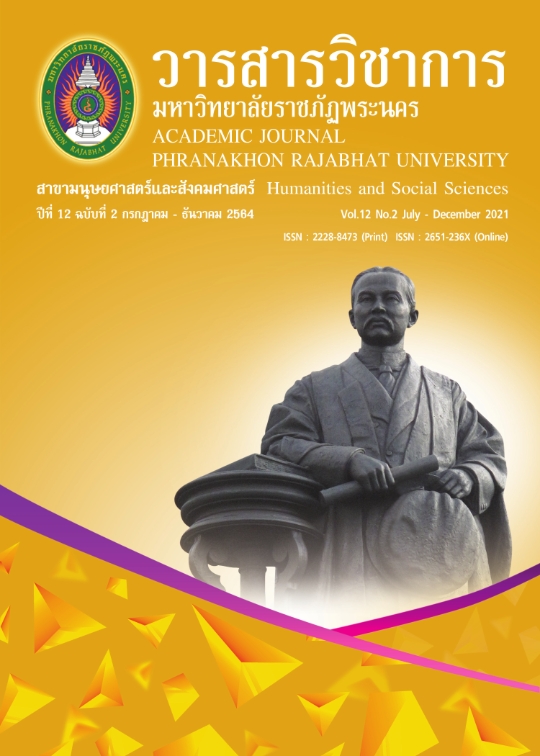GUIDELINE FOR THE ESTABLISHMENT OF COMMON LAND MANAGEMENT LAWS BETWEEN GOVERNMENT AND PEOPLE
Keywords:
Community Right, Co-Management, Common Property Regime, Collective RightsAbstract
The article on the guideline for the establishment of common land management laws between government and people aimed: 1) to study the land management laws of Thailand whether it relates with principles and measurements that allow community to have right in managing, maintenance and using land resources in a balanced and sustainable manners, 2) to study the concepts and principles of Co-management as well as its measurements in order to rectify and institute the land co-management laws between government and people, 3) to study the factors affecting the legislation of the common land management laws between government and people, and 4) to provide suggestions on the preparation of land management law in Thailand.
The results showed that the Co-management of land between the government and people must be carried out these relevant guidelines: 1) Reorganization of the relevant legal structure to the determination of rights of common property (Common Property Regime) and having all elements considered. 2) Legislation, rectification, amendments of relevant laws as well as legal review. The law should be based on the basic concept of Collective Rights, and intensively improve the laws so that it supports community to have rights in establishment of land management institutions and other necessary legal measurements. 3) Application of co-management principles in land management in Thailand. The government policy must adopt the Constitution provision to create a framework of formulating public policy in allocating land for the poor. The land management policy must meet the people’s needs especially for those who have no arable land by setting up responsible management agencies in all levels of management. For administration, good management could reduce conflicts by having local plans which correspond to the main policies and plans. In addition, administration power should be decentralized to the local organizations. For the tax measurement, various types of tax measurements should be employed. For the public participation, the component of the National Land Policy Committee should be reorganized by allowing more representative from public sector to join. The state must build up a network of participation of people in community by teaming up the local people in the form of a formal committee, creating the working process contributing to the community’s strengths, having the appropriate proportion of local representatives in the committee, organizing a forum for representatives of public sector, non-government organizations, independent organizations, independent academics and local-philosophers and having local wisdom applied in all dimensions.
References
Local Act. (2019) http://www.landactionthai.org/land/index.php?option=com_content&view=article&id=1275. Retrieved on 26th Dec 2019.
ONEP. (2008). Land management strategy project report. Office of Natural Resources and Environmental Policy Planning. https://tdri.or.th/wpcontent/uploads/2012/09/n78.pdf. Retrieved on 13th Nov 2018
Onprom, S. Community Forestry. (2011). Forest Communities: Community control
Technology in the new forest? A case study of community forest Huay Kaew.
Huay Kaew district. Meaon District. Chaing Mai Province.
Secretariat of the Senate. (2015). Report of the Natural Resources and Environmental Reform Commission of the National Reform Council. Reform Agenda 11th. Land reform and Land management. https://dl.parliament.go.th/handle/lirt/427032. Retrieved on 22th Jan 2017.
Senasu, W. (2013). Decentralization and Local Self-government. Bangkok: Pantai.
Sinthipong, U. (2004). Constitution and Environmental protection. Bangkok: Bangkok
University.
Sinthipong, U. (2014). Legal Measures for the Co-management of Natural Resources: Case of Community- based Fisheries Co-management. Thesis. Chulalongkorn University.
Siripongtugsin, N. (2014). Aimed to investigate the causes of conflict on Tungsa Public
Land. Humanities and Social Sciences Vol. 31 No. 3: September-December.
Songrak, A. (2018). Guidelines for management of marine and coastal resources in Trang
Province. Source. http://www.learners.in.th/blogs/ posts/228409. Retrieved on 27th Mar 2018.
Downloads
Published
How to Cite
Issue
Section
License
"บทความวิชาการในวารสารฉบับนี้ ถือเป็นความรับผิดชอบของผู้เขียนเท่านั้น"
สงวนลิขสิทธิ์ตามพระราชบัญญัติลิขสิทธิ์




